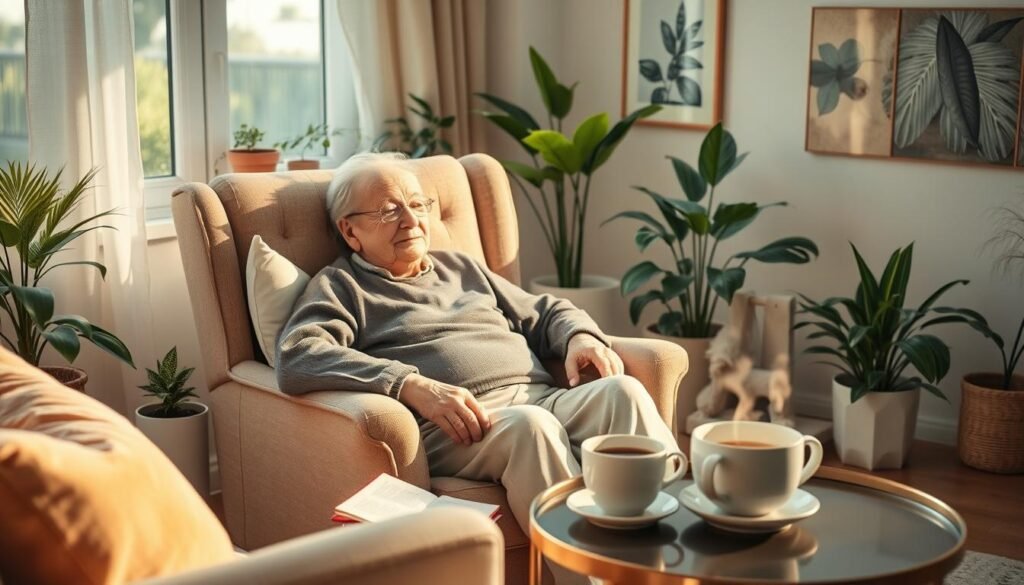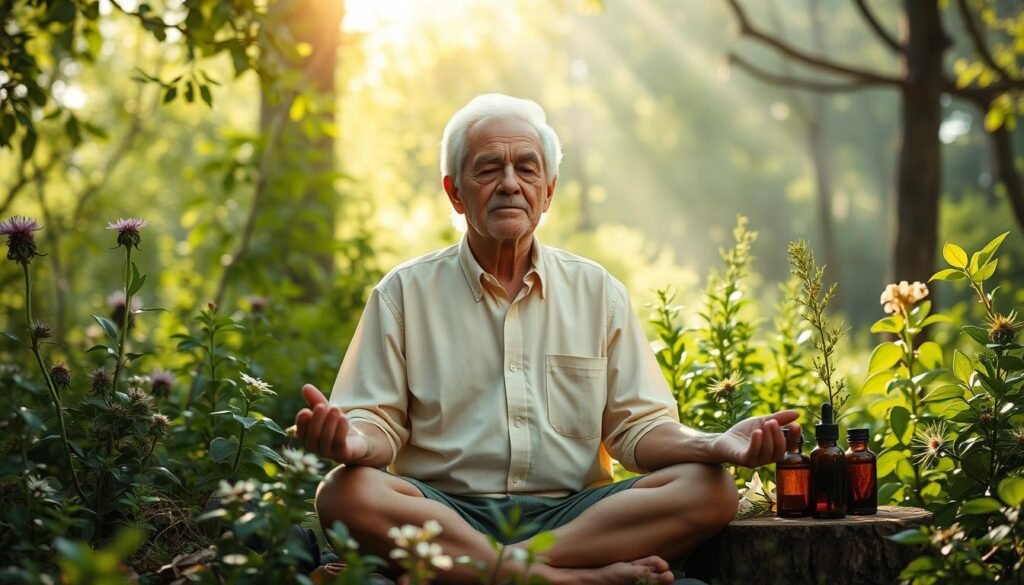Did you know that 10 to 20 percent of older adults in the U.S. suffer from anxiety? This statistic shows how common anxiety disorders are in the elderly. Yet, many don’t get the help they need. The elderly face many life challenges like loss, chronic illnesses, and side effects from medicines. These issues can make their fear and worry worse. Thus, it’s vital to know how to treat severe anxiety in the elderly.
This includes medicines, therapy, and changing their lifestyle. Our expert guide gives insights into different treatment options for elderly anxiety. It helps caregivers, healthcare workers, and families manage anxiety in seniors effectively. By spotting symptoms early and using a thorough approach, we can greatly improve older adults’ lives who are dealing with anxiety.
Key Takeaways
- Anxiety is common among the elderly, with 10-20% affected.
- Untreated anxiety can lead to cognitive impairment and reduced quality of life.
- Treatment options include psychotherapy, medication, and lifestyle changes.
- Cognitive-behavioral therapy is particularly effective for anxiety disorders.
- Collaboration with healthcare providers is essential for effective management.
Understanding Severe Anxiety in the Elderly
Severe anxiety impacts 10% to 20% of elderly people. It’s crucial to understand that anxiety in the elderly often looks different than in younger adults. They might feel anxious due to money worries, health issues, losing independence, or grief.
Generalized Anxiety Disorder (GAD) is the most common anxiety disorder in older adults. It mostly affects women, especially those who’ve gone through major life changes like divorce or losing a partner. Anxiety symptoms can include trembling, trouble breathing, dizziness, chest pain, stiff muscles, and avoiding certain situations. These symptoms can be mistaken for normal aging or other health problems. This makes careful check-ups important.
Good sleep is key to managing anxiety. Not sleeping well can make anxiety 30% worse the next day. So, it’s important for elderly people to try and get 7 to 9 hours of sleep every night. Looking at how aging, cognitive decline, and past trauma interact helps us understand anxiety in the elderly better.
Offering support and keeping communication open is vital for helping the elderly with severe anxiety. Creating a supportive space can lessen their fears. It allows them to share their worries about anxiety. This can lead to better ways of coping and improve their life quality.
Common Anxiety Disorders in Older Adults
Understanding common anxiety disorders in older adults is vital as more people are living longer. Around 18% of elderly home care patients have an anxiety disorder. The types of anxiety in elderly individuals require special attention from caregivers and medical teams.
Generalized Anxiety Disorder (GAD) is the most common, affecting 7.3% of the elderly. It causes constant worry that interferes with everyday activities. Phobias are next, with a 3.1% rate, causing intense fears that may lead to panic attacks. Panic disorder is less common at 1%. OCD is the least common, affecting just 0.6% of older adults.
It’s important to recognize these disorders in seniors, as their symptoms can be different than in younger people. Symptoms in the elderly might include more physical issues, like tiredness and trouble sleeping. Anxiety often happens alongside other chronic diseases, making careful assessments critical.
| Anxiety Disorder | Prevalence Rate | Associated Symptoms |
|---|---|---|
| Generalized Anxiety Disorder (GAD) | 7.3% | Persistent worry, fatigue, sleep disturbances |
| Phobias | 3.1% | Excessive fear, avoidance behavior |
| Panic Disorder | 1% | Panic attacks, heart racing, shortness of breath |
| Obsessive-Compulsive Disorder (OCD) | 0.6% | Obsessions, compulsions, intrusive thoughts |
Knowing about these common anxiety disorders in seniors is key to helping them. As we understand more, we can offer the right support. This helps improve their quality of life significantly.
How Do You Treat Severe Anxiety in the Elderly
Dealing with severe anxiety in the elderly needs a careful plan. It starts with checking the patient thoroughly, with help from their caregivers. This check-up looks for reasons behind the anxiety, like health issues, medication reactions, and mental disorders. It’s key to make a treatment plan that fits the person’s needs.
The Importance of Comprehensive Assessment
A detailed check-up covers many areas to understand the senior’s mental health. It involves looking into symptoms, what stresses them out, and their health history. Knowing all about their health issues, medicines they take, and their family’s mental health is vital. This way, doctors can pinpoint the best way to help.
Identifying Symptoms of Anxiety
Anxiety shows up differently in the elderly compared to younger folks. They might feel chest pain, have trouble breathing, or feel tense. They could also worry a lot, get easily upset, or have trouble remembering things. Spotting these signs right is crucial for treating severe anxiety. Talking often about these symptoms is important for picking the right help and keeping track of how things are going.

| Symptom | Potential Underlying Causes |
|---|---|
| Chest pain | Panic disorder, Generalized anxiety disorder |
| Shortness of breath | Panic disorder, PTSD |
| Irritability | Generalized anxiety disorder, PTSD |
| Fatigue | Chronic medical conditions, Medication side effects |
| Cognitive impairment | Dementia, Depression |
Anxiety Management for Seniors: A Holistic Approach
Anxiety in seniors needs a broad understanding. It combines understanding mental and physical health. A holistic approach focuses on changing lifestyles, increasing social activities, and using specific therapies. These methods address anxiety with natural solutions and support vital activities to boost well-being.
In the U.S., over 19% of adults suffer from anxiety yearly. Older adults face their own challenges. Doing moderate exercise can really help improve moods and lower stress. Exercises that are more intense can be very helpful too. They change how the brain works, which can make you feel better.

Natural remedies are key in managing elderly anxiety holistically. For example, chamomile tea can lower stress hormones. Having pets around can offer emotional support. This helps fight off loneliness and manages anxiety better.
Therapies, like cognitive behavioral therapy (CBT), are effective for anxiety. They help seniors deal with their fears and build strength. Joining support groups and trying art therapy can also help. Such activities build community ties, crucial for good mental health.
Combining therapy, medication, and relaxation techniques offers a full set of tools for seniors. Methods like meditating, writing in a journal, and walking in nature help lower anxiety. These steps let seniors actively improve their mental health.
To learn more, visiting effective management strategies for elderly anxiety is useful. It offers insights for caregivers and seniors alike.
Non-Pharmacological Interventions for Senior Anxiety
To help seniors with anxiety, we focus on non-drug treatments. These methods aim to improve their lifestyle and give them ways to cope better. By choosing healthier habits and learning new coping skills, seniors can feel less anxious. This makes their life better.
Benefits of Lifestyle Modifications
Changing one’s lifestyle is key to reducing anxiety in older people. These lifestyle changes improve health and bring balance to life. Some main changes include:
- Nutrition: Eating less saturated fats and sugars can help lower anxiety. Adding more fruits, veggies, and whole grains is good for mental health.
- Exercise: Doing regular heart-pumping exercises can decrease symptoms of anxiety.
- Sleep: Good sleep is essential for managing emotions. A regular sleep schedule enhances mental well-being.
- Caffeine and Alcohol: Cutting down on coffee and alcohol can significantly reduce anxiety levels.
Coping Strategies for Geriatric Anxiety
Besides changing their lifestyle, seniors can use coping methods to deal with anxiety. These methods build strength and emotional health:
- Relaxation Techniques: Techniques like deep muscle relaxation and deep breathing can quickly lower anxiety.
- Mindfulness: Activities such as meditation or yoga improve mental focus and emotional balance.
- Journaling: Writing about daily life and feelings helps seniors express their emotions, reducing anxiety.
- Structured Activities: Having a daily routine helps seniors feel in control, which is crucial for managing anxiety.
- Support Groups: Support groups provide a space to share stories and advice, helping to combat loneliness.

Psychotherapy for Older Adults with Anxiety
Psychotherapy is key in treating anxiety in older adults. Around 10 to 20 percent of seniors struggle with anxiety. It’s important to find the right therapy for them. Customized psychotherapy helps seniors stay mentally well and learn how to cope.
Cognitive Behavioral Therapy for Geriatric Anxiety
Cognitive Behavioral Therapy (CBT) is a top choice for older people with anxiety. It helps them see and change negative thoughts that cause anxiety. By changing these thoughts, they feel less anxious. Experts run these sessions, making sure they fit what each older person needs. Research shows CBT really works for seniors.
Mindfulness-Based Approaches for Senior Anxiety
Mindfulness techniques are great for senior anxiety too. They help seniors focus on the now and handle anxious feelings better. Mindfulness helps control emotions and eases anxiety symptoms. By practicing mindfulness, seniors gain a calm and stable feeling. Along with CBT, mindfulness gives a full plan for improving mental health.
Pharmacological Treatments for Severe Anxiety
Doctors often treat severe anxiety in older people with medicines, focusing on antidepressants like SSRIs and SNRIs. These medicines are key for helping many seniors feel better and enjoy life more. Knowing what medications are available helps doctors create more effective, personalized plans for treating anxiety.
Understanding Medication Options
Doctors frequently prescribe medications such as escitalopram (Lexapro), duloxetine (Cymbalta), venlafaxine (Effexor XR), and paroxetine (Paxil) for generalized anxiety disorder. These treatments can greatly help people with severe symptoms. However, it’s also important to understand their challenges and limits.
- Between one-third and one-half of patients on modern antidepressants do not achieve sustained remission from anxiety.
- Approximately 30–50% of patients on SSRIs may experience side effects such as nausea, diarrhea, and insomnia.
- Only half of patients refill their first prescription, with many discontinuing treatment within the first six months.
- Some patients might require 10–12 weeks or longer to respond to the treatment.
It’s essential to work closely with healthcare providers when deciding on treatment plans. This ensures they are tailored to fit each person’s health and medication responses.
Risks of Benzodiazepines in Older Adults
Benzodiazepines can quickly relieve anxiety but aren’t usually recommended for older adults. They can lead to cognitive issues and increase the risk of falls and injuries, especially for those with substance abuse history. When looking at treatments, it’s critical to balance these risks against potential benefits.
Being well-informed helps in making choices about anxiety medications for seniors. Working with doctors to track how well medications work and their side effects can improve safety and effectiveness in anxiety management.
| Medication | Type | Common Side Effects | Duration for Effectiveness | Suitability for Elderly |
|---|---|---|---|---|
| Escitalopram (Lexapro) | SSRI | Nausea, insomnia, fatigue | 1-2 weeks | Yes |
| Duloxetine (Cymbalta) | SNRI | Dizziness, dry mouth, drowsiness | 1-2 weeks | Yes |
| Venlafaxine (Effexor XR) | SNRI | Nausea, sexual side effects | 1-2 weeks | Yes |
| Paroxetine (Paxil) | SSRI | Weight gain, sexual dysfunction | 1-2 weeks | Yes |
| Benzodiazepines | Short-term | Cognitive impairment, dependence | Immediate | No |
Relaxation Techniques for Elderly Anxiety
Managing anxiety in seniors can improve with relaxation techniques. Studies show these methods bring calm, slow heartbeats, and lower blood pressure. They also make sleep better and boost mental health.
Among the effective relaxation techniques for elderly anxiety are:
- Progressive muscle relaxation
- Deep breathing exercises
- Guided imagery
- Meditation
- Tai Chi
- Yoga
- Biofeedback
- Massage therapy
- Music and art therapy
- Aromatherapy
- Hydrotherapy
Seniors can fight severe anxiety better by using these techniques and other positive coping methods. For example, being outdoors, in places with lots of blues and greens, can make one feel renewed.
Learning relaxation techniques helps seniors notice when their muscles are tense or they’re stressed. Knowing this can lead to better stress management. With time and patience, they can get better at using these skills every day.
Some may find these techniques make them uncomfortable. If this happens, it’s best to stop and talk to a doctor or therapist. Finding joy in happy memories, talking to friends, or being with pets can ease anxiety too. Caregivers find that familiar things or activities often comfort seniors.
For more on certain techniques, look into cognitive-behavioral strategies. They can help make relaxation even more effective and improve well-being.
Conclusion
Treating severe anxiety in seniors needs careful understanding of what affects their mental health. Nearly 14% of older adults have an anxiety disorder. This greatly impacts their life quality and raises healthcare costs. A good plan to manage anxiety includes detailed assessments to find symptoms and make a fitting treatment plan.
It helps to mix non-drug treatments, like lifestyle changes and psychotherapy, with medications when needed. Drugs like SSRIs and SNRIs are often the first choice. But, it’s important to be careful with them since older people might have side effects. Getting better can take time, and antidepressants might need 2-3 months to work fully.
By working closely with doctors, families and caregivers can help their loved ones deal with anxiety complexities. For those wanting more info on treatments, check out this resource. Committing to improve mental health for the elderly improves their overall well-being and is essential.